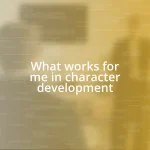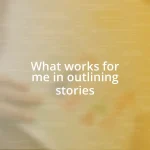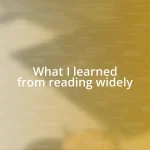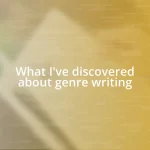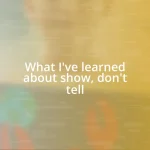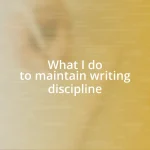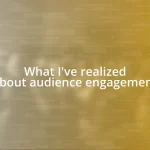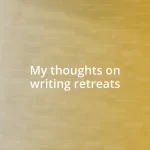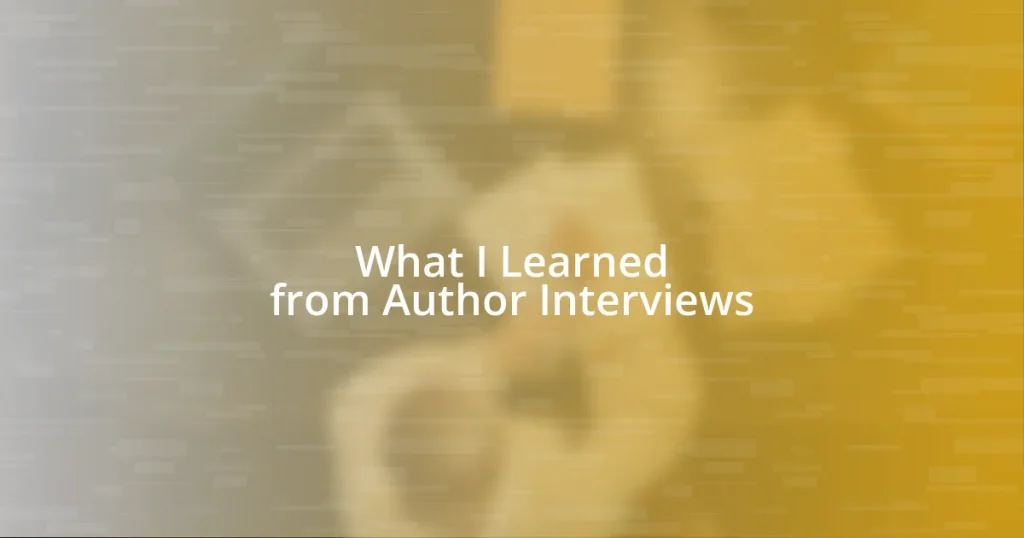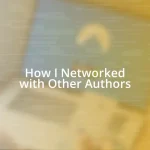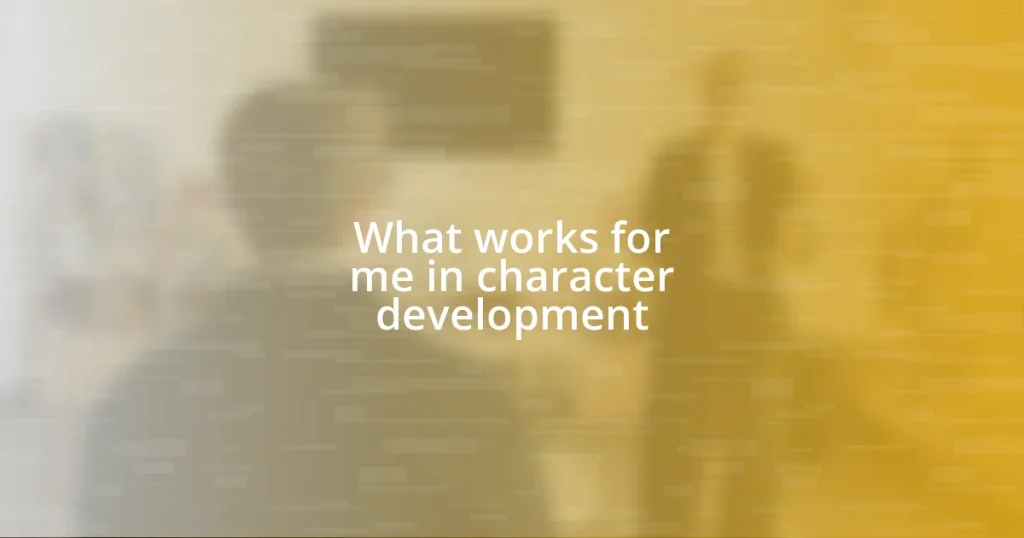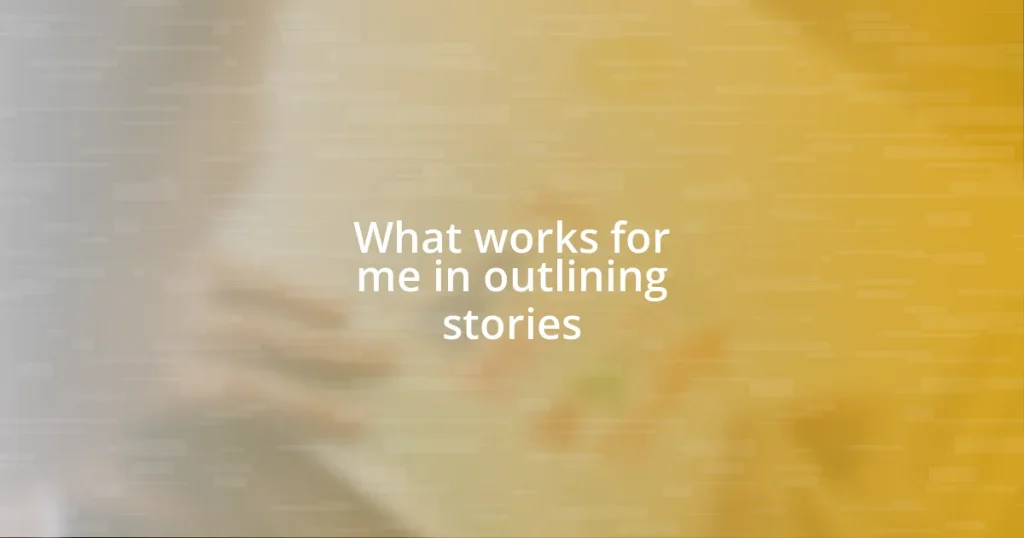Key takeaways:
- Author interviews reveal the emotional journeys of writers, highlighting the importance of vulnerability and connection in storytelling.
- Effective questioning techniques, such as open-ended questions and active listening, foster deeper insights and richer conversations.
- Building rapport with authors enhances the interview experience, allowing for genuine conversations that reveal personal struggles and creative processes.

Overview of Author Interviews
Author interviews provide a captivating window into a writer’s mind, revealing the intricacies behind their creative process. From my experience, each conversation feels like unearthing treasure; you never quite know what gems of wisdom you’ll find. I often find myself wondering—what makes them tick?
During my interviews, I’ve been struck by how authors express their passions and fears, often shedding light on the personal stories that shape their narratives. I recall one interview where the author shared a heartfelt story about overcoming rejection, reminding me that perseverance is as vital as talent. Such genuine moments not only deepen my understanding but also bond me with the author on a human level.
Moreover, these dialogues serve as a crucial platform for authors to share their inspirations and challenges. Listening to them articulate their struggles often evokes empathy; it’s enlightening to realize that behind every published work lies a journey filled with uncertainty. Have you ever felt compelled to tell your own story after hearing someone else’s? For me, those conversations ignite a spark of creativity, encouraging me to explore my own narrative.

Key Takeaways from Interviews
Author interviews often unveil the emotional landscapes of writers, showcasing their triumphs and setbacks. One thing I’ve learned is that vulnerability fosters connection. I recall an interview that lasted hours—filled with laughter and tears—where the author opened up about their early struggles with self-doubt. Hearing that narrative not only encouraged me to embrace my imperfections but also inspired me to share my own creative hurdles with others. There’s power in those moments of honesty.
Another vital takeaway revolves around the diversity of writing processes. Each author has a unique method that suits their style, whether it’s meticulously outlining their plots or letting the story unfold organically. I remember a particularly enlightening discussion where an author described their spontaneous approach to character development. This insight challenged my preconceived notions about structure in writing and prompted me to experiment with my own techniques, ultimately broadening my creative palette.
Lastly, I’ve seen how author interviews can cultivate a sense of community. Learning about the collaborative efforts authors make, like beta readers and critique groups, was eye-opening for me. I used to think writing was a solitary endeavor, but hearing them speak about how their support systems play a crucial role in their work shifted my perspective. It made me seek out connections within my own circle, reinforcing the idea that we grow together in this journey.
| Key Takeaway | Insight |
|---|---|
| Vulnerability | Fosters deeper connections with readers and peers. |
| Diversity of Process | Each writer has a unique approach, encouraging experimentation. |
| Community Support | Collaborative efforts enhance the writing experience. |

Effective Questioning Techniques
Effective questioning techniques can dramatically shape the direction of an author interview. I’ve found that open-ended questions really evoke deeper responses, allowing authors to share more than just surface-level thoughts. For instance, asking, “What was the moment you decided to pursue writing seriously?” can lead to powerful stories filled with emotion and significance. I remember one author opening up about a life-altering experience that prompted them to write their first novel, something I never would have discovered with a simple “What inspired you?”
Here are some techniques I’ve found beneficial:
- Use Open-Ended Questions: These encourage detailed responses, paving the way for richer discussions.
- Follow-Up Questions: They show genuine curiosity and can uncover deeper insights. I once asked an author about a specific character, which led to an unexpected revelation about their personal experiences.
- Balance Personal and Professional Queries: This combination allows for a well-rounded view of the author’s life and work, making the conversation more relatable.
- Listen Actively: Being fully present can help in crafting spontaneous questions that arise organically from the dialogue.
When I put these techniques into practice, I often return energized and inspired, eager to share the newfound perspectives on storytelling that I’ve gathered from the authors.

Building Rapport with Authors
Building rapport with authors truly transforms the interview experience. One time, I noticed a subtle shift when I shared a personal story about my own writing struggles before diving into the questions. It was as if a door swung open, allowing the author to feel more at ease. Have you ever felt that warm, inviting moment when someone relates to your experiences? It not only builds trust but fosters a sense of camaraderie that makes the conversation flow naturally.
Moreover, I’ve learned the importance of genuine curiosity. During an interview with a debut novelist, I remember asking about their favorite book from childhood. Their face lit up as they spoke about it, and I could see the passion behind their words. It’s astonishing how a simple question can reveal someone’s true essence and get us both excited about the conversation. Don’t you think these moments of connection are what bring interviews to life? They create an engaging atmosphere where the author feels valued and understood, strengthening our interaction.
Lastly, paying attention to non-verbal cues can enhance rapport significantly. I recall an instance when an author began to fidget during a tough question. Instead of pushing forward, I paused and shifted the conversation to a lighter topic. Their relief was palpable. Have you ever noticed how a small change in direction can ease tension? By being attentive, I not only earned their trust but created an environment where they could express themselves freely. This level of awareness makes a difference—not just in the interview, but in building lasting connections within the literary community.

Extracting Valuable Insights
Extracting valuable insights from author interviews is often about diving deeper than the initial layers of conversation. I remember one particular interview where I hesitated to ask a probing question regarding the author’s writing process. But when I finally did, the author revealed their unique ritual of writing at dawn while sipping herbal tea. It struck me how these small details not only illuminate their creative journey but also resonate with other writers facing similar challenges. Isn’t it fascinating how such personal practices can inspire others?
On another occasion, during a discussion about the impact of current events on their work, an author shared how a recent global issue reshaped their narrative. It was inspiring to see them connect personal experiences with wider societal themes. I realized then that drawing out these connections can yield profound insights—showing not just what authors write, but why they write it. How often do we fail to connect our own narratives to larger world events, missing out on rich discussions?
Moreover, I’ve found that sharing my own experiences invites authors to open up. In one interview, I recounted my struggles with self-doubt as a writer. The author, initially reserved, suddenly shifted and candidly discussed their own fears of inadequacy. This moment of vulnerability created a pathway to deeper insights about resilience and authenticity in writing. Have you ever noticed how sharing just a little of our own story can unlock a treasure trove of insights from others?

Common Challenges in Interviews
Common challenges in interviews can leave both the interviewer and author feeling a bit uneasy. I’ve faced moments where questions fell flat, leaving an awkward silence hanging in the air. I remember one such interview where I asked a seemingly simple question, only to see the author respond with a puzzled look. It made me realize how crucial it is to tailor questions to the author’s experiences and context. Have you ever felt that sudden shift in energy when a question doesn’t resonate?
Another common hurdle is managing the balance of control in the conversation. I often find myself wrestling with the urge to guide the discussion while also wanting the author to lead with their thoughts. During one interview, I sought to steer the topics toward specific books, but the author kept circling back to their life experiences. I realized then that sometimes letting go of my agenda allows for more authentic and enriching exchanges. Isn’t it interesting how following their lead can uncover unexpected gems in the dialogue?
Lastly, there’s the challenge of keeping conversations on track while also allowing for spontaneity. I once chatted with an author who began sharing a story unrelated to my questions. At first, I hesitated, worried about losing focus. But then, I decided to embrace this detour, and the conversation became vibrant and filled with emotion. Did you know that these unexpected moments often reveal the heart of the author’s journey? I’ve learned that being flexible can not only deepen our conversation but also enrich our understanding of their work.

Applying Lessons from Interviews
One of the most impactful lessons I’ve learned from author interviews is the power of active listening. There was a time when I caught myself focusing too much on the next question instead of fully absorbing the author’s words. In one memorable conversation, I paused long enough to let the author finish their thought. It was in that quiet moment of reflection that I realized the richness of their experience—an authentic story unfolded that I would have otherwise missed. Have you ever felt the difference in energy when we genuinely connect?
Also, it’s essential to embrace the unexpected. During an interview, I once asked an author about their favorite writing tool, and they unexpectedly shifted the conversation to their favorite childhood book. Instead of redirecting, I leaned in and explored this direction further. What emerged was a beautiful dialogue about how our formative experiences shape our creativity. Isn’t it fascinating how veering off-script can lead to some of the most poignant insights?
Lastly, I’ve found that asking open-ended questions can yield more rewarding conversations. In one of my earlier interviews, I tended to stick to straightforward queries like “What inspired your book?” It wasn’t until I switched to, “Can you share a moment during your writing process that made you feel vulnerable?” that I tapped into the heart of the matter. This shift opened the door to a profound discussion about fear, risk, and the art of storytelling. Have you experienced the magic that happens when you move beyond surface-level inquiries?
